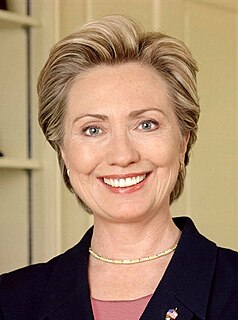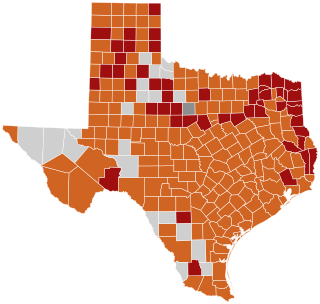Related Research Articles

The Iowa caucuses are biennial electoral events for members of the Democratic and Republican parties in the U.S. state of Iowa. Unlike primary elections in most other U.S. states, where registered voters go to polling places to cast ballots, Iowans instead gather at local caucus meetings to discuss and vote on the candidates. During both the presidential and midterm election seasons, registered Iowan voters vote in a per-precinct caucus for the party of which they are registered as a member. The caucuses are also held to select delegates to county conventions and party committees, among other party activities.

From January 3 to June 3, 2008, voters of the Democratic Party chose their nominee for president in the 2008 United States presidential election. Senator Barack Obama of Illinois was selected as the nominee, becoming the first African American to secure the presidential nomination of any major political party in the United States. However, due to a close race between Obama and Senator Hillary Clinton of New York, the contest remained competitive for longer than expected, and neither candidate received enough pledged delegates from state primaries and caucuses to achieve a majority, without endorsements from unpledged delegates (superdelegates).

The 2008 Iowa Democratic presidential caucus occurred on January 3, and was the state caucuses of the Iowa Democratic Party. It was the first election for the Democrats of the 2008 presidential election. Also referred to as "the First in the Nation Caucus," it was the first election of the primary season on both the Democratic and Republican sides. Of the eight major Democratic presidential candidates, then-U.S. Senator Barack Obama of Illinois received the most votes and was ultimately declared the winner of the Iowa Democratic Caucus of 2008, making him the first African American to win the caucus and the first African American to win a primary state since Jesse Jackson in 1988. Former U.S. Senator John Edwards of North Carolina came in second place and then-U.S. Senator Hillary Clinton of New York finished third, though Clinton received more delegates than Edwards. Campaigning had begun as early as two years before the event.
The results of the 2008 Democratic Party presidential primaries are the detailed outcomes of a series of contests by which members of the United States Democratic Party chose their candidate for the 2008 U.S. presidential election. The contests are held in each of the fifty U.S. states, as well as the District of Columbia, Puerto Rico, American Samoa, Guam, the U.S. Virgin Islands, and Democrats Abroad. The outcomes include totals of delegates selected as well as popular votes

The 2008 United States presidential election in Iowa took place on November 4, 2008, as part of the 2008 United States presidential election. Voters chose seven representatives, or electors to the Electoral College, who voted for president and vice president.

The 2008 New Hampshire Democratic presidential primary on January 8, 2008 was the first primary in the United States in 2008. Its purpose was to determine the number of delegates from New Hampshire that would represent a certain candidate at the National Convention. In a primary, members of a political party—in this case, the Democratic Party—will select the candidates to a subsequent election. Since 1920, New Hampshire has always hosted the first primaries in the entire nation. The Democratic Party's primary occurred on the same day as the Republican primary.

The 2008 Nevada Democratic presidential caucuses took place on January 19, 2008 after having been moved from a later date by the Nevada Democratic Party. The Nevada Democratic Caucus was considered important in determining the eventual party nominee, as many described it as the "Bellwether of the West" seeing as how it is the first Western state to vote in the Democratic Presidential Primary season.

The Nevada presidential caucuses were an electoral event in which citizens met in precinct caucuses to elect delegates to the corresponding county conventions. The 2020 Nevada caucuses were the last held in the state before the state legislature signed a law which abolished the Nevada Caucus and replaced it with a Primary. There are 17 counties in Nevada and so there are 17 conventions. The county conventions then select delegates to Nevada's State Convention, which then choose delegates for the presidential nominating conventions.

The 2008 Colorado Democratic presidential caucuses took place on Super Tuesday, February 5, 2008. As he did in every other state that held a caucus rather than a primary, Barack Obama won the caucus by a wide, two-to-one margin over Hillary Clinton.

The 2008 Kansas Democratic presidential caucuses took held on Super Tuesday, February 5, 2008, with 21 delegates at stake. The remaining 11 delegates were selected at the Kansas Democratic Party District Conventions on April 12. The state, and a majority of its delegates, were won by Barack Obama.

The 2008 Alaska Democratic presidential caucuses took place Super Tuesday, February 5, 2008. This was the first time that Democrats in Alaska participated in Super Tuesday, and the large turnout forced at least one caucusing site to delay closing its doors far beyond the 6 p.m. deadline. The state had a total of 13 delegates at stake. Barack Obama won the Alaska Democratic Caucuses and secured 9 delegates to the Democratic National Convention while Hillary Clinton took 4 delegates. However, the caucus was non-binding, and Alaska's Democratic State Convention in May awarded Obama 10 pledged delegates.

The 2008 Idaho Democratic presidential caucuses were held on Super Tuesday, February 5, 2008, with 18 national delegates at stake. For the first time, caucuses were held in all 44 counties, all of them open caucuses organized at the county level rather than the precinct level.

The 2008 Washington Democratic presidential caucuses were a series of events held by the Washington State Democratic Party to determine the delegates that the Party sent to the 2008 Democratic National Convention. Delegates were selected in a four-tier process that began with precinct caucuses, was further refined in legislative district caucuses and/or county conventions, concluded for some delegates in the congressional district caucuses, and finally concluded for the remaining delegates at the state convention.

The 2008 Nebraska Democratic presidential caucuses took place on February 9, 2008, where 24 of the state's 31 convention delegates were chosen. Like he did throughout many other states that held caucuses instead of primaries, Barack Obama won the Nebraska Democratic Caucus by more than a two-to-one margin of victory over Hillary Clinton. On May 13, 2008, the state also held a non-binding primary election which Obama also won but the margin of victory was considerably smaller.

The 2008 Maine Democratic presidential caucuses took place on February 10, 2008, and had 24 delegates at stake. The winner in each of Maine's two congressional districts received all of that district's total delegates, which totaled 16. Another eight delegates were awarded to the statewide winner, Barack Obama, at the Maine Democratic Party Statewide Convention on May 31, 2008. These 24 delegates represented Maine at the Democratic National Convention in Denver, Colorado. Another 10 unpledged delegates, known as superdelegates, also attended the convention and cast their votes as well.

The 2008 Hawaii Democratic presidential caucuses took place on February 19, 2008, with 20 pledged delegates at stake. The winner in each of Hawaii's two congressional districts was awarded all of that district's delegates, totaling 13. Another seven delegates were awarded to both candidates at the Hawaii Democratic Party State Convention on May 23–25, 2008. These 20 delegates represented Hawaii at the Democratic National Convention in Denver, Colorado. Nine other unpledged delegates, known as superdelegates, also attended the convention and cast their votes as well.

The 2008 Texas Democratic presidential primary and caucuses were a series of events to determine the delegates that the Texas Democratic Party sent to the 2008 Democratic National Convention. Delegates were selected using results from two sources: the Texas Presidential Primary held on March 4 by the Secretary of State of Texas's office, and a series of caucus events held between March 4 and June 7 by the Texas Democratic Party. The indecisive results of Super Tuesday, and the fact that Texas had the largest number of delegates among the states remaining on the Democratic primary calendar, resulted in the Texas primary receiving significant attention from both the Hillary Clinton and Barack Obama campaigns.

The 2008 Texas Republican presidential primary took place on March 4, 2008. John McCain won the primary election, giving him enough delegate votes to guarantee his nomination at the 2008 Republican National Convention.

The 2008 United States presidential election in Washington took place on November 4, 2008, and was part of the 2008 United States presidential election. Voters chose 11 representatives, or electors to the Electoral College, who voted for president and vice president.

From January 3 to June 5, 2012, voters of the Democratic Party chose its nominee for president in the 2012 United States presidential election. President Barack Obama won the Democratic Party nomination by securing more than the required 2,383 delegates on April 3, 2012, after a series of primary elections and caucuses. He was formally nominated by the 2012 Democratic National Convention on September 5, 2012, in Charlotte, North Carolina.
References
- ↑ Nassar, George. "Texas Democratic Caucus FAQ." The Texas Blue. 03/04/2008. http://www.thetexasblue.com/texas-democratic-caucus-faq
- ↑ "Texas Democrats dropping confusing caucus system". www.dallasnews.com. Retrieved 2016-01-26.